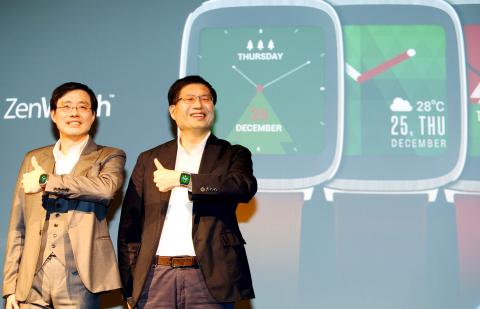Asustek Computer Inc (華碩), the world’s No. 5 PC brand, yesterday said that it plans to introduce two more wearable devices in the second half of next year, seeking to repeat the success of the smartwatch it launched recently in a bid to become one of the world’s top three suppliers of wearable devices.
Asustek’s ZenWatch has been rolled out ahead of Apple Inc’s Apple Watch, which is expected to hit the market early next year.
“ZenWatch is our first wearable device powered by Goolge Inc’s Android Wear system,” Asustek chief executive Jerry Shen (沈振來) said at a product launch for the local market, following the smart device’s overseas debut.

Photo: CNA
Shen said the market reactions to the ZenWatch in the US and Japan have been satisfying. He declined to disclose sales figures.
“Select European countries, China and Hong Kong will be included in the second wave of ZenWatch launches,” he added.
The company said that supplies of the smart device are running short in the US and Japan, which Shen attributed to a components shortage.
Asustek only utilizes 50 percent of its 50,000 units-a-month capacity.
The supply shortage could extend to February next year, Shen said.
Despite this, Asustek is planning to launch the second-generation ZenWatch — which has a voice call function and a smart wristband — in the third quarter of next year.
Asustek hopes that the device, which is priced at NT$5,990, gains popularity in the mass market. That figure is almost half of Apple Watch’s price tag of at least US$349.
Since smartwatches are the first Internet of Things product with foreseeable growth potential, Asustek will strive to become “a key player” in this sector, Shen said.
The company is to boost ZenWatch production in the second half of next year, either to produce the first-generation models, or the second-generation ones, Shen said.
Separately, Shen said that “the weak yen has not affected the revenue ZenWatch has generated for Asustek because the product was launched in Japan in November and the currency appears to have stopped falling since then.”
Asustek’s share price closed down 0.88 percent at NT$337 yesterday, underperforming the TAIEX, which gained 0.97 percent.

SELL-OFF: Investors expect tariff-driven volatility as the local boarse reopens today, while analysts say government support and solid fundamentals would steady sentiment Local investors are bracing for a sharp market downturn today as the nation’s financial markets resume trading following a two-day closure for national holidays before the weekend, with sentiment rattled by US President Donald Trump’s sweeping tariff announcement. Trump’s unveiling of new “reciprocal tariffs” on Wednesday triggered a sell-off in global markets, with the FTSE Taiwan Index Futures — a benchmark for Taiwanese equities traded in Singapore — tumbling 9.2 percent over the past two sessions. Meanwhile, the American depositary receipts (ADRs) of Taiwan Semiconductor Manufacturing Co (TSMC, 台積電), the most heavily weighted stock on the TAIEX, plunged 13.8 percent in

A wave of stop-loss selling and panic selling hit Taiwan's stock market at its opening today, with the weighted index plunging 2,086 points — a drop of more than 9.7 percent — marking the largest intraday point and percentage loss on record. The index bottomed out at 19,212.02, while futures were locked limit-down, with more than 1,000 stocks hitting their daily drop limit. Three heavyweight stocks — Taiwan Semiconductor Manufacturing Co (TSMC, 台積電), Hon Hai Precision Industry Co (Foxconn, 鴻海精密) and MediaTek (聯發科) — hit their limit-down prices as soon as the market opened, falling to NT$848 (US$25.54), NT$138.5 and NT$1,295 respectively. TSMC's

ASML Holding NV, the sole producer of the most advanced machines used in semiconductor manufacturing, said geopolitical tensions are harming innovation a day after US President Donald Trump levied massive tariffs that promise to disrupt trade flows across the entire world. “Our industry has been built basically on the ability of people to work together, to innovate together,” ASML chief executive officer Christophe Fouquet said in a recorded message at a Thursday industry event in the Netherlands. Export controls and increasing geopolitical tensions challenge that collaboration, he said, without specifically addressing the new US tariffs. Tech executives in the EU, which is

In a small town in Paraguay, a showdown is brewing between traditional producers of yerba mate, a bitter herbal tea popular across South America, and miners of a shinier treasure: gold. A rush for the precious metal is pitting mate growers and indigenous groups against the expanding operations of small-scale miners who, until recently, were their neighbors, not nemeses. “They [the miners] have destroyed everything... The canals, springs, swamps,” said Vidal Britez, president of the Yerba Mate Producers’ Association of the town of Paso Yobai, about 210km east of capital Asuncion. “You can see the pollution from the dead fish.